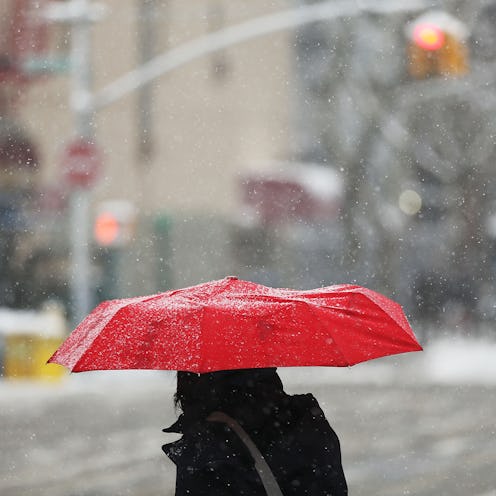Life
If You Have This Personality Type, You May Be More Likely To Get Seasonal Affective Disorder

As temperatures drop and the days get shorter, you might be bracing yourself for the long winter months ahead. If you live anywhere that gets a full on winter season, it’s easy get tired of the cold, snow, and rain for months on end, and this can affect your mood. But for people who manage seasonal affective disorder (SAD), the fall and winter months can be extra challenging. According to the National Institute of Mental Health (NIMH), SAD is a type of depression that sets in because of seasonal changes. It usually starts in the late fall and early winter, and then lifts once spring and summer arrive. There’s also a version of SAD that happens during the spring and summer months, but it’s more rare. SAD has all the characteristics of major depression, so if you manage the condition, you might feel depressed, fatigued, and have problems with your sleep, among other symptoms. Some experts also say that your personality type could actually make you more likely to develop SAD.
According to a study published in the journal Chronobiology International, research suggests that certain personality traits can make you more prone to the seasonal blues. While the main cause of SAD is linked to shorter days and less sunlight, personality types may respond differently to these seasonal shifts.
People who are more prone to depression in the first place are more likely to develop SAD, clinical psychologist Deborah Offner PhD tells Bustle via email. “In part, those with personality types most susceptible to depression will be those most vulnerable to SAD, because both are mood disorders with a significant biological — as well as psychological — basis. However, there are some traits that might make people vulnerable to SAD that differ from those that are linked to depression.”
NIMH reports that people with SAD might have trouble regulating serotonin, which is a neurotransmitter involved in keeping moods stable. Additionally, people with SAD might also be deficient in vitamin D, while producing too much of the sleep hormone melatonin, which is why you might feel sluggish and tired during SAD episodes. Mother Nature Network (MMN) writes that research suggests that, based on a model of five personality types, there may be a link between stress coping styles — which vary among personality types — and seasonal mood changes.
People with seasonal mood disorders tend to score higher on ‘openness’, MMN reports, and tend to be more sensitive to their environments, have a wide range of interests, and dislike routine. Personalities high in openness may to be more attuned in to their external environment, so it makes sense that seasonal changes might affect this type more. Also, personality types that score high on ‘pessimism’ and ‘neuroticism’ tend to be more prone to SAD, and mood disorders in general, Dr. Offner says. Emotions like anxiety, irritability, and overall moodiness are more prevalent in this personality type.
“Extraversion — thriving and deriving energy from being around other people,” is also a potential risk factor for SAD, Dr. Offner says. “In geographic regions where the winter season is cold, social activity diminishes and people are more prone to ‘hibernate’. Thus many people, in particular extraverts, find the winter months more isolating, lonely, and depressing.”
It’s also important to note that, while not a personality trait, “being female is a risk factor for SAD; women are much more likely than men to be affected,” Dr. Offner says.
How you handle stress can also play a major role in whether you’re more prone to SAD, and how you deal with any mental health symptoms you might have. If you lean towards an avoidance coping style, you might use distractions like sleep or watching Netflix to get through challenging times. Basically, you try to distract yourself and sleep your symptoms off if you have this stress management style. While there’s nothing wrong with self-care via unplugging and rest, if distraction is used too much, it might mean you feel worse and not better when it comes to depression symptoms.